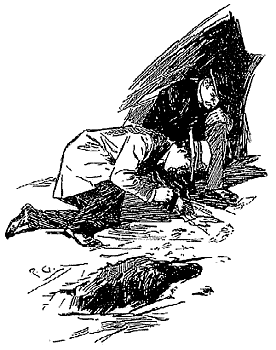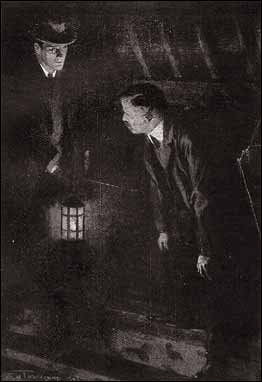| シャーロックホームズが説明する 1 | シャーロックホームズが説明する 2 |
Chapter 6 | 第六章 |
SHERLOCK HOLMES | シャーロックホームズが |
GIVES A DEMONSTRATION | 説明する |
“NOW, Watson,” said Holmes, rubbing his hands, “we have half an hour to ourselves. Let us make good use of it. My case is, as I have told you, almost complete; but we must not err on the side of overconfidence. Simple as the case seems now, there may be something deeper underlying it.” | 「さて、ワトソン」 / ホームズは言った / 手を擦りながら / 「半時間我々に与えられた◆これを上手く利用しよう◆この事件は / 既に言ったように / ほとんど終わっている / しかし過信しすぎて失敗するべきではない◆この事件が今、単純に見えても / 何かその下にもっと深いものがあるかもしれない」 |
“Simple!” I ejaculated. | 「単純!」 / 私は叫んだ |
“Surely,” said he with something of the air of a clinical professor expounding to his class. “Just sit in the corner there, that your footprints may not complicate matters. Now to work! In the first place, how did these folk come and how did they go? The door has not been opened since last night. How of the window?” He carried the lamp across to it, muttering his observations aloud the while but addressing them to himself rather than to me. “Window is snibbed on the inner side. Frame-work is solid. No hinges at the side. Let us open it. No water-pipe near. Roof quite out of reach. Yet a man has mounted by the window. It rained a little last night. Here is the print of a foot in mould upon the sill. And here is a circular muddy mark, and here again upon the floor, and here again by the table. See here, Watson! This is really a very pretty demonstration.” | 「その通り」 / 彼は臨床学教授が生徒に説明するような雰囲気で言った◆「その隅に座っていてくれ / 君の足跡が事態をややこしくするかもしれないから◆では始めよう / まず最初に / 犯人はどのように来て、どのように去ったか? / あの扉は昨夜から開けられていない◆窓はどうだ?」 / 彼はランプをそこに持って行った / その間自分の観察をつぶやきながら / しかしそれを私ではなくむしろ自分に言い聞かせながら◆「窓は内側から掛け金が掛けられている◆窓枠は頑丈だ◆横に蝶番はない◆開けてみよう◆雨どいのパイプはない◆屋上は完全に手が届かない◆それでも男は窓に上がっている◆昨夜はちょっと雨が降った◆窓枠の上に土の足跡がある◆そしてここに泥のまるい跡が / そして床の上にも / そしてテーブルの横にも◆これを見ろ、ワトソン! / これは実に確かな証拠だ」 |
I looked at the round, well-defined muddy discs. | 私は丸い輪郭がはっきりした泥の円盤を見た |
“That is not a foot-mark,” said I. | 「それは足跡じゃないな」 / 私は言った |
“It is something much more valuable to us. It is the impression of a wooden stump. You see here on the sill is the boot-mark, a heavy boot with a broad metal heel, and beside it is the mark of the timber-toe.” | 「これはもっと遥かに価値の高いものだ◆これは木の棒の跡だ◆この窓枠の上に靴の跡が見えるだろう / 広い金属の踵がついた重いブーツだ / そしてその側にあるのが木製の義足の跡だ」 |
“It is the wooden-legged man.” | 「それは木製の義足の男か」 |
“Quite so. But there has been someone else – a very able and efficient ally. Could you scale that wall, Doctor?” | 「その通り◆しかし誰か別の人間がいた / / 非常に有能で手際のよい相棒だ◆君はあの壁をよじ登れるか / 先生?」 |
I looked out of the open window. The moon still shone brightly on that angle of the house. We were a good sixty feet from the ground, and, look where I would, I could see no foothold, nor as much as a crevice in the brickwork. | 私は開かれた窓から外を見た◆月はまだ明るく家のこの面を照らしていた◆この階は地面からたっぷり60フィートはあった / そして / どこを見回しても / 足場は見当たらなかった / しかも煉瓦の割れ目さえも |
“It is absolutely impossible,” I answered. | 「これは完全に不可能だ」 / 私は答えた |
“Without aid it is so. But suppose you had a friend up here who lowered you this good stout rope which I see in the corner, securing one end of it to this great hook in the wall. Then, I think, if you were an active man, you might swarm up, wooden leg and all. You would depart, of course, in the same fashion, and your ally would draw up the rope, untie it from the hook, shut the window, snib it on the inside, and get away in the way that he originally came. As a minor point, it may be noted,” he continued, fingering the rope, “that our wooden-legged friend, though a fair climber, was not a professional sailor. His hands were far from horny. My lens discloses more than one blood-mark, especially towards the end of the rope, from which I gather that he slipped down with such velocity that he took the skin off his hands.” | 「助けがなければそうだ◆しかしもし君の友人がここにいたと仮定してみてくれ / あの隅にある太いロープを君に垂らし / 反対側の端をこの壁のかぎに縛って止めたと◆これなら / 僕の考えでは / もし活動的な人間なら / よじ登れるかもしれない / 義足なんかでも◆出て行けるだろう / もちろん / 同じ方法で / そして共犯者がロープを引き揚げ / かぎから解き / 窓を閉め / 内側から掛け金を掛け / 元来たのと同じ方法で逃げる◆小さなことだが / 覚えておいた方がいいかもしれない」 / 彼は続けた / ロープをいじりながら / 「この木製の義足の友人は / なかなかのクライマーだが / しかしプロの船員ではない◆彼の手は全然ごつごつしていない◆僕が拡大鏡で調べると一つ以上の血の跡があった / 特にロープの終わりにかけて / これから僕は推理した / 彼は非常に早く滑り降りて / 手の皮を剥いたと」 |
“This is all very well,” said I; “but the thing becomes more unintelligible than ever. How about this mysterious ally? How came he into the room?” | 「それは結構だ」 / 私は言った / 「しかし物事はさらに分かりにくくなる◆この謎の共犯者はどうなるんだ? / どうやって彼は部屋に入ったんだ?」 |
“Yes, the ally!” repeated Holmes pensively. “There are features of interest about this ally. He lifts the case from the regions of the commonplace. I fancy that this ally breaks fresh ground in the annals of crime in this country – though parallel cases suggest themselves from India and, if my memory serves me, from Senegambia.” | 「そう / 共犯者だ!」 / ホームズは考え込むように繰り返した◆「この共犯者には興味を引く特徴がある◆彼はこの事件を平凡な領域以上にしている◆僕はこの共犯者は新境地を開拓したように思う / この国の犯罪史の / / しかし似たような事件が示唆するが / インドと / 僕の記憶が確かなら / セネガンビアの」 |
“How came he, then?” I reiterated. “The door is locked; the window is inaccessible. Was it through the chimney?” | 「いったいどこから来たんだ?」 / 私は繰り返した◆「扉は鍵がかかっている / 窓は近寄れない◆煙突を抜けたのか?」 |
“The grate is much too small,” he answered. “I had already considered that possibility.” | 「格子が細かすぎる」 / 彼は言った◆「僕は既にその可能性を考えていた」 |
“How, then?” I persisted. | 「じゃあ、どのように?」 / 私はしつこく聞いた |
“You will not apply my precept,” he said, shaking his head. “How often have I said to you that when you have eliminated the impossible, whatever remains, however improbable, must be the truth? We know that he did not come through the door, the window, or the chimney. We also know that he could not have been concealed in the room, as there is no concealment possible. When, then, did he come?” | 「君は僕の指針を適用しようとしないな」 / 彼は言った / 首を振って◆「何回僕が君に言ったか / 不可能を削除していけば / 残るものがなんであろうとも / いかにありそうもなくても / それが真実に違いないと / 我々は知っている / 彼は入れなかった / 扉から / 窓から / 煙突から◆我々はこれも知っている / 彼は部屋の中に隠れていることはできなかった / ここには隠れる場所がないので◆では / どこから来たか?」 |
“He came through the hole in the roof!” I cried. | 「天井の穴から来たのか!」 / 私は叫んだ |
“Of course he did. He must have done so. If you will have the kindness to hold the lamp for me, we shall now extend our researches to the room above – the secret room in which the treasure was found.” | 「もちろんそうだ◆彼はそこから来たに違いない◆もしよければランプを持ってきてくれ / 今から上の部屋に調査を広げよう / / 財宝が見つかった秘密の部屋だ」 |
He mounted the steps, and, seizing a rafter with either hand, he swung himself up into the garret. Then, lying on his face, he reached down for the lamp and held it while I followed him. | 彼は脚立に登り / そして / 両手で垂木を掴み / 体を揺らして屋根裏部屋に上がった◆それから / うつ伏せになって / ランプに手を伸ばして受け取って持った / 私が彼にならって上がる間 |
The chamber in which we found ourselves was about ten feet one way and six the other. The floor was formed by the rafters, with thin lath and plaster between, so that in walking one had to step from beam to beam. The roof ran up to an apex and was evidently the inner shell of the true roof of the house. There was no furniture of any sort, and the accumulated dust of years lay thick upon the floor. | 我々が上がったその部屋は / 一辺が10フィートでもう一片が6フィートだった◆床は構成されていた / 垂木の間に薄い木摺としっくいで / したがって歩く人間は垂木から垂木に足を置かなければならなかった◆屋根は頂点に向かって斜めになっており / それは明らかに本当の家の屋根の内側だった◆そこにはまったく室内装飾らしいものはなく / 長い年月の埃が床に厚く溜まっていた |
“Here you are, you see,” said Sherlock Holmes, putting his hand against the sloping wall. “This is a trapdoor which leads out on to the roof. I can press it back, and here is the roof itself, sloping at a gentle angle. This, then, is the way by which Number One entered. Let us see if we can find some other traces of his individuality?” | 「ここだ、見てみろ」 / シャーロックホームズは言った / 傾いた壁に手を置いて◆「これは屋根の上に上がれる跳ね上げ戸だ◆押し上げられるぞ / そしてここが屋根だ / ゆったりとした角度で傾いている◆ではここが / 最初の男が入った道だ◆見てみよう / 我々が別の彼の個人的特長の手がかりを見つけられるかどうか?」 |
 | |
He held down the lamp to the floor, and as he did so I saw for the second time that night a startled, surprised look come over his face. For myself, as I followed his gaze, my skin was cold under my clothes. The floor was covered thickly with the prints of a naked foot – clear, well-defined, perfectly formed, but scarce half the size of those of an ordinary man. | 彼はランプを床に降ろした / そして彼がそうした時 / 私はこの夜二度目の / ギョッとした驚きが彼の表情に浮かぶのを見た◆私自身も / 彼の視線を追って / 服の中の肌が冷たくなった◆床は一面に裸足の足跡でいっぱいだった / / 綺麗な / 輪郭のはっきりした / 完全な形の / しかし普通の男性のやっと半分くらいの大きさの |
 | |
“Holmes,” I said in a whisper, “a child has done this horrid thing.” | 「ホームズ / 私はそっと言った / 子供がこの恐ろしい事をしたのか」 |
He had recovered his self-possession in an instant. | 彼は一瞬で冷静さを取り戻していた |
“I was staggered for the moment,” he said, “but the thing is quite natural. My memory failed me, or I should have been able to foretell it. There is nothing more to be learned here. Let us go down.” | 「一瞬驚いた」 / 彼は言った / 「しかしこれはごく自然なことだ◆僕はうっかりしていた / そうでなければ僕は予期できたはずだ◆ここにはもう調べるものはないな◆下りよう」 |
| シャーロックホームズが説明する 1 | シャーロックホームズが説明する 2 |